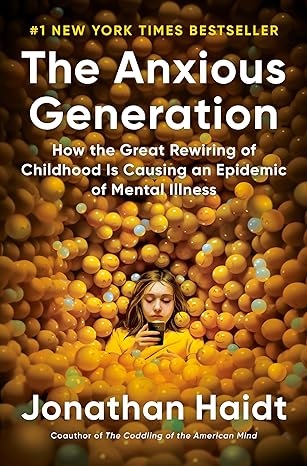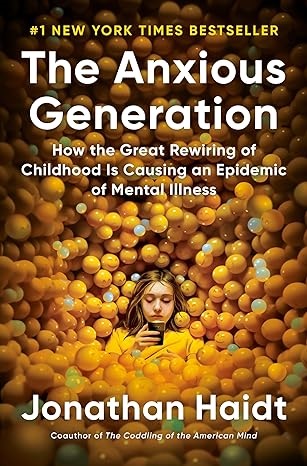- Books
- 3 de June de 2024
- No Comment
- 8 minutes read
The Anxious Generation

The Anxious Generation
The Anxious Generation by Jonathan Haidt, a controversial book that has inspired an informed and stimulating debate in the Anglo-Saxon world


Minors and Mobile Phones and Vice Versa
Concerns about the influence of new trends and technologies on young people are not new. In the volume of the comprehensive History of Young People dedicated to the contemporary age, authors such as Laura Malvano, Eric Michaud, and Luisa Passerini demonstrated the predilection of the fascist and communist authoritarian regimes for targeting youth in the first third of the 20th century to implement their new political projects and break with the past. This strategy was adopted in the 1950s by American democracy to consolidate its liberal values through consumption and the rise of pop culture.
It is within this line of critical thinking that Jonathan Haidt’s book, recently published in Spain by Deusto, can be situated: La generación ansiosa. Por qué las redes sociales están causando una epidemia de enfermedades mentales entre nuestros jóvenes (The Anxious Generation: How the Great Rewiring of Childhood Is Causing an Epidemic of Mental Illness). This work might find its closest reflection in another forgotten book from 1982, The Disappearance of Childhood by the renowned Neil Postman. In this book, the often-prescient professor (his Amusing Ourselves to Death: Public Discourse in the Age of Show Business is essential reading) accuses television of destroying childhood by ‘adultifying’ it, erasing the dividing line between childhood and adulthood in three ways: because it requires no instruction to understand its form; because it does not make complex demands on the mind or behaviour; and because it does not divide its audience (differentiating between children and adults). The pursuit of the child audience and the unfiltered screen time in American society—without preventing us from enjoying that great TV series Dream On—resulted in the loss of innocence for several generations, condemned to a static childhood without games or secrets, leading to the decline and twilight of childhood. Postman’s recipe: limit children’s exposure to media for their own good. Take note of this.
Haidt’s prescriptions are similar, but his criticisms are directed at mobile phones, particularly smartphones, which allow internet connection and the use of all kinds of applications. His book has generated extraordinary controversy in the Anglo-Saxon world, both in the media and academic circles. Haidt, a social psychologist and professor in New York, is not new to this, and some of his previous postulates—such as the Moral Foundations Theory—have been debated and criticised. Nonetheless, he is a prominent figure with an extensive career and a skilled polemicist.
Before arriving in Spain, Haidt presented his proposals and defended himself against media and academic criticisms, some of them very fierce, through various channels. The best summary of his book was published in The Atlantic magazine. His Substack channel, After Babel, is a must-read. And the book has also its own promotional and consultative website . Later on, we will analyse its reception in the media and the academic criticisms it has received, but for now, the focus is on the book and its proposals.
In a concise manner, Haidt warns against the terrible cost of a phone-based childhood, protests against the excessive screen time spent by children and teenagers, points to the possible reconfiguration of young brains (the ‘great rewiring’), and argues that the mental health epidemic affecting young people worldwide (with rising rates of depression and suicide) is due to this permitted and invisible influence of mobile phones and social networks on the identity and personality construction of the affected generations. However, unlike Postman, Haidt’s argument is that this time, what is happening is that the maturation process that every human being is being hindered, promoting an infantilisation that will affect the entire life of the affected individuals.
Haidt places the responsibility for action on private and individual environments, without being particularly aggressive towards the addictive patterns deliberately designed by the companies that manage the most used social networks by young people or online gaming companies. Nor does he seem to insist on public measures that could be implemented or demands on the concerned companies and internet providers to mitigate the terrible consequences of spending too much time on screens, whose multiple causes and reasons should be analysed in more detail. His appeal is to individuals, families, and perhaps educators. Therefore, his solutions are simple, easy to implement, and focus on homes and schools: no smartphones before secondary education (around 14 years old); no social networks before 16; mobile-free educational centres (something that is already being experimented with and even regulated in Spain); and certainly, more independence, free play, and responsibility in the real world for children, a task that falls to parents.
In his most recent article, Haidt and his collaborator Zack Rausch praise the rebellious capacity of Generation Z, and highlight various civil society activist initiatives that align with their concerns and proposals. While quite sensible, much of what he proposes has received numerous criticisms that deserve to be known and considered. Let’s hope that the timely publication of his book in Spain is able to generate a rigorous, calm, and non-Manichaean debate about minors, mobile phones, and vice versa. Neither reality is immutable nor society the same as it was before the advent of the internet, social networks, and now artificial intelligence. All this helps to understand better the world today.
Title: The Anxious Generation
Author: Jonathan Haidt
Publisher: Penguin Press
Language: English
ISBN: 9780593655030
Number of pages: 400 Page
Publication date: Mar 26, 2024
Source: educational EVIDENCE
Rights: Creative Commons

